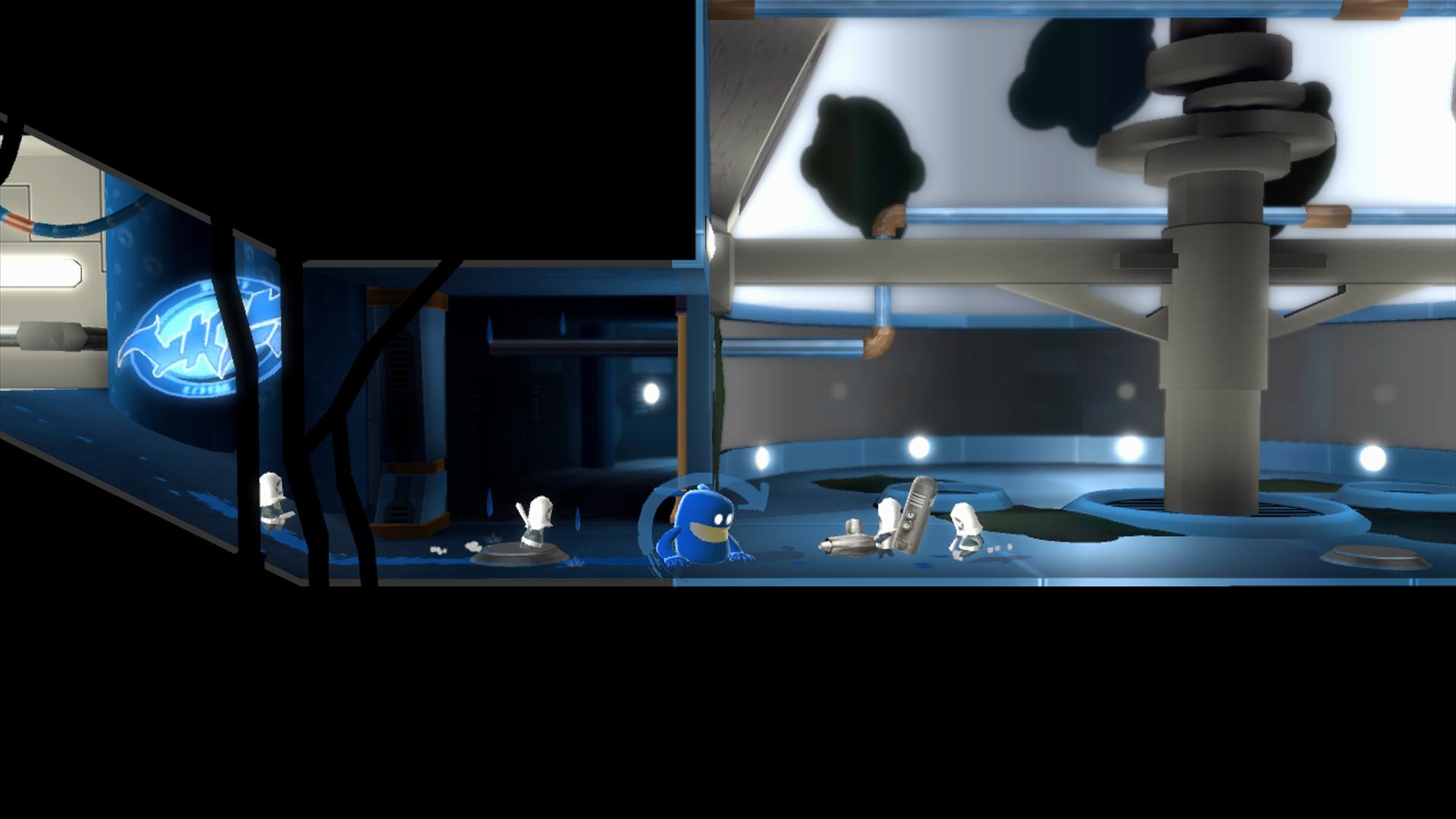12DOVE Verdict
Pros
- +
Undeniably charming
- +
Satisfies compulsive tendencies
- +
Creates a unique world for the eyes and ears
Cons
- -
Too damn easy
- -
Doesn't explore potential of coloring puzzles
- -
Gets a bit repetitive after a while
Why you can trust 12DOVE
The original de Blob was enough of a hit that it has now officially jumped to Xbox 360, PS3, and DS (although that will be a different review). So now we have that weird scenario where players new to a game’s world must be able to grasp what’s going on, while at the same time those who played the first game need enough new toys to not feel like they’re playing the same game all over again. It seems clear that de Blob 2, afraid of scaring off the new players, hasn’t gone far enough to evolve its formula.
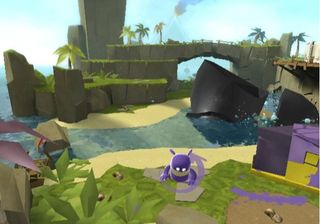
That formula is still an interesting one, though. Despite the childlike overtones, the world of de Blob is actually kind of creepy within its veneer of cutesiness. The evil INKT forces want to drain all color from the world and force all its inhabitants to be mindless, suit-wearing automatons. It’s up to Blob to bring some color and life back to the world. Blob is a ball of spongy material that sops up whatever paint he touches, so your job is to find specific colors of paint and then simply roll over the environment, turning a gray world into something an interior decorator would be proud of (assuming said decorator was into garish primary colors everywhere).
When the entire world starts off gray and you have the ability to paint it with color piece by piece, the pull on compulsive personalities is strong. Beware: it becomes increasingly difficult to leave anything gray the more color you provide to the environment. The good news is that many, many challenges are related to all this compulsive coloring, and each challenge provides a reward of Inspiration, which is a currency that you can spend on upgrading Blob. Also beware that should you choose to take on the challenges, it will suck up your time, increasing the length of levels to nearly ninety minutes a piece. Either way you play it, the game is a good 10-12 hours long.
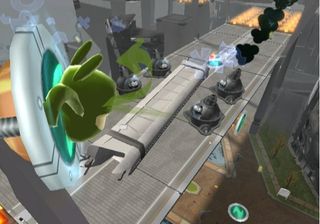
We're glad that the sequel has abandoned the "flick remote to jump" mechanic and instead allowed us to jump using the A button. It's an improvement, and likely a necessary one with the more precise and frequent jumps now required by the sidescrolling portions of the game. The combat, if it can be called that, hasn't really changed andis extremely simple: you simply lock on to a nearby enemy by holdingZ and then hitting A, which launches Blob into the air and slams him down on top of the enemy. By merely holdingZ and mashing theA button you can clear an entire screen of enemies in seconds, making the inclusion of the more basic enemies in the game almost pointless as they pose next to zero threat. Later the game introduces foes who will shoot you out of the air if you jump, so instead of slamming them you have to ram them. Aside from a few other enemy variations, it doesn’t get any more interesting, and like most of the game, feels too easy.
In fact, we felt a vague disengagement from de Blob 2 while playing despite its fantastic visual and auditory flourishes simply because the actual game part of it is so basic, repetitive, and nearly challenge-free. We imagine it will be non-forbidding to children, but do kids need that much handholding? We played Super Mario Bros. when we were young and that is a damn hard game and we loved it. We’re not saying that de Blob 2 needs to be that difficult, but the game feels like it’s practically taking a dive for you, and the possibilities of mixing paint colors and painting specific buildings certain shades never feels explored to a point that really makes you think beyond rudimentary route-planning.
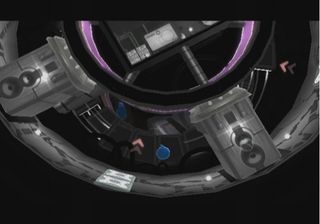
We have to say, though, that the game’s charm goes a long way in making the experience enjoyable. For one, just watching a boring world spring to life is constantly rewarding. The other aesthetic element carried over from the first game is that the soundtrack changes based upon how you paint, increasing in complexity and adding new instruments tied to each color: yellow is a trumpet, brown is a record scratch. The game’s writing, simple as it is, is still utterly disarming and amusing, with cutscenes cleverly telling a progression of farcical events without the reliance on dialogue. The characters exude personality despite being nothing more than globs of goo with eyes.
There are a few new features for the sequel, including powerups and 2D side-scrolling sections. The powerups don’t change much, with hazmat protecting Blob from poisonous ink, the regen doing the obvious, and unlimited ramming providing brief stints of even more overpoweredness. The one powerup that’s pretty darn cool is the gravity bomb, which counts down while expanding its threat radius until it sucks all items and enemies into you as if you’re a black hole. The 2D sections are a nice way of breaking up the action but don’t really capitalize on the potential involved, instead mostly sticking to extremely basic jumping and matching of colors.
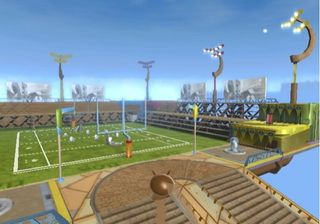
There’s multiplayer available in two forms, although they’ll probably only appeal to kids (while the rest of the game can easily appeal to any age). One involves simply having a second player pick up a controller during the single-player mode. This works almost exactly like the two-player in Super Mario Galaxy: the second player has a cursor and shoots paint to defeat enemies and grab items. It will probably serve as a fun cooperative element for young players, but it makes an already too easy game even easier. The second multiplayer mode is Blob Party, which provides splitscreen mini-challenges with unique levels where players cooperate to complete missions but also compete to get the higher score. With a handful of levels it will provide an hour or two of fun but won’t exactly live up to its “party” moniker.
De Blob 2, like its predecessor, is an undeniably cheerful, whimsical, and infectiously amusing venture that’s impossible to dislike unless you’re Ebenezer Scrooge (pre-spiritual epiphany, that is). It has some creative gameplay and it satisfies that primitive need to finish a page in a coloring book once you’ve started it. It’s not as deep as it wants to be, but it has enough substance to pick up and play after buying it for your kids (or younger siblings). We wish it had stretched its creative muscles more and really expanded on the potential for coloring puzzles instead of playing it safe so as not to be too difficult for young brains. After all, kids are smarter than they’re given credit for most of the time.
Feb 22, 2011
More info
| Genre | Action |
| Platform | "DS","3DS","Wii","Xbox 360","PS3" |
| US censor rating | "Everyone","Everyone","Everyone","Everyone","Everyone" |
| UK censor rating | "","","","","" |
| Release date | 1 January 1970 (US), 1 January 1970 (UK) |

6 years later, Far Cry New Dawn is getting a 60 FPS update on Xbox Series X and PS5, and the way it was revealed is sending me: "Well… this wasn’t how we planned to announce this"

The Sims 2's long-awaited comeback meets a mixed response on Steam thanks to a barebones port suffering prolific crashes

This indie open-world RPG takes Stardew Valley's fishing and turns it into its main combat system: "This is not a peaceful fishing game. The destruction of the world is imminent"
